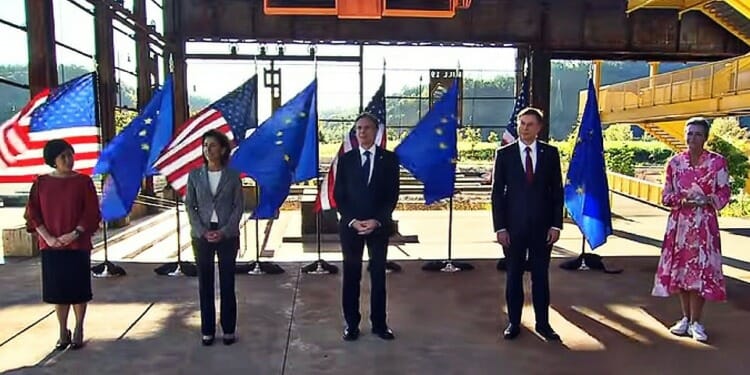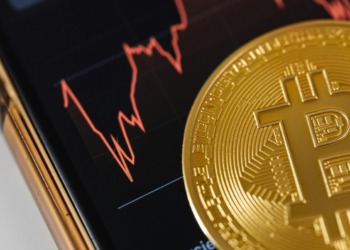The recent AUKUS affair that had darkened US-French relations threatened to derail the inaugural meeting of the newly-formed EU-US Trade and Technology Council (TTC), proposed by the EU soon after Biden had won the elections and intended as a major cooperation tool to repair the damage done by Trump to EU-US relations. After a direct call between Biden and Macron, the TTC meeting went ahead and was held yesterday in Pittsburgh as planned. Observers acknowledged it was a success, opening up new vistas of trade collaboration between the world’s two economic heavyweights, the US and Europe, particularly in the key sectors of trade and tech.
The meeting was attended on the European side by two of its most important EU commissioners: Margrethe Vestager, who oversees the bloc’s digital policy and competition law, and Valdis Dombrovskis, in charge of economic and trade matters. On the American side, the participants were equally important: State Secretary Antony Blinken, Commerce Secretary Gina Raimondo and Trade Representative Katherine Tai. The fact that Blinken, America’s policy chief co-chaired the meeting served to underscore the political dimension of the new Tech and Trade Council.
Predictably, the EU and the US made all the right soundbites in their inaugural joint statement issued at the end of the meeting, reaffirming the TTC’s objectives to “coordinate approaches to key global technology, economic, and trade issues; and to deepen transatlantic trade and economic relations, basing policies on shared democratic values.” As Karen Kornbluh, director of the German Marshall Fund’s Digital Innovation and Democracy Initiative and former U.S. ambassador to the OECD said: “Despite the modest communique and lack of fanfare, there’s a seismic shift in the global economic ground rules happening in Pittsburgh. The U.S. and Europe each had serious frustrations to address – the US against China and Europe against US tech companies – that were undermining U.S.- EU relations and providing an opening China exploited to dominate a number of key industries and launch cyber incursions.” And she concluded: “There are clearly still tensions, which resulted in less progress on the key digital input of semiconductors than expected, and China is not standing still. But the efforts today are a win-win for both the Biden Administration’s foreign policy agenda and Ursula von der Leyen’s digital Europe.”
The shadow of China indeed loomed large over the meeting. And that is how the European People’s Party, the largest political grouping at the European Parliament, saw it in its tweet, saying that the TTC was “a step forward on how to defeat China”:
🇨🇳 China challenges us in a way that we have not seen before.
We have to respond.
The EU-US Trade and Technology Council is a practical step forward on how to defeat China.
Hear more 👇 from @MEP_Ehler ahead of tomorrow’s #TTC meeting in Pittsburgh 🇺🇸 pic.twitter.com/Sa27Y9XeSq
— EPP Group (@EPPGroup) September 28, 2021
On the eve of the meeting in Pittsburgh, that EU Commissioner Dombrovskis told Bloomberg that the EU and US were still divided over their dispute regarding Trump-era metals tariffs and said that only about a month remained to resolve the dispute with the US. A failure to do so, he said, would mean new EU tariffs would be hitting American products by December 1. Trump, in his trade war against China, had applied in 2018 the so-called section 232 tariffs on imports of steel and aluminum from other nations, labeling competition on the metals from the EU a national security threat along with China. The EU had retaliated by targeting 2.8 billion euros ($3.3 billion) of American imports with duties on some big-brand products, including Harley-Davidson Inc. motorcycles, Levi Strauss & Co. jeans and bourbon whiskey.
US Commerce Secretary Raimondo also on the eve of the Trade and Technology meeting, told the Economic Club of Washington that resolving the tariff dispute is among her top priorities and that the metals duties “have created tremendous tension” with the EU. “President Trump and the last administration didn’t treat our allies well. I have to make up for that, you have to smooth that over to regain some trust,” she said.
Unfortunately, the Trade and Technology Council’s joint statement, despite positive wording, does not specifically address this issue, as it remains diplomatically silent on specifics and mentions no countries. In short, the metals dispute will need to be resolved elsewhere. Other areas that will require additional work negotiations
The New Trade and Technology Council’s Agenda
Perhaps we shouldn’t be surprised that no major announcements were made as none were really foreseen: The meeting in Pittsburgh laid the ground to allow both sides to clearly lay out their overall policy priorities and direction for the next rounds of talks, as the Trade and Technology Council is is expected to meet periodically at political level. And to develop the methods of work from one meeting to the next, with 10 working groups.
Criteria laid out to guide TTC policy included “investment screening regimes” to protect national security and public order; using a “multilateral approach to export controls”; a shared intention to “develop and implement AI systems; commitment to “building a partnership on the rebalancing of global supply chains in semiconductors; protection of workers and labour rights, and combat forced and child labour and avowed intention to “address relevant trade, climate, and environmental issues”; a readiness to consult “closely with diverse stakeholders on both sides of the Atlantic as we undertake our work in the TTC”.
The working groups cover the following areas to be developed jointly: (1) Technology Standards; (2) Climate and Clean tech; (3) Supply chain resilience and security; (4) Information and Communication Technology and Services (ICTS) security and competitiveness; (5) Data governance and technology platform governance; (6) Misuse of technology to threaten security and Human Rights; (7) Export controls (including licensing practices); (8) Investment screening; (9) Promoting the access of small- and medium-sized (SME) business to and use of digital tools; (10) Global Trade Challenges. The latter may be the broadest one as it is tasked with reviewing challenges from new and unnecessary technical barriers resulting from emerging technology, promoting and protecting labor rights and decent work, and trade and environment issues as they arise.
The next political meeting of the Trade and Technology Council will take place in France next year, during the French presidency of the EU. There is a lot of work ahead since several issues remain in suspense, notably:
- World Trade Organization: Nothing was said on how it might be fixed after having been gutted by Trump of its ability to issue binding rulings and so far the Biden administration has made no effort to restore it;
- The transatlantic data transfer deal: It was struck downNo mention was made regarding by the EU’s Court of Justice because of insufficient privacy protections in the U.S.;
- EU dealings with China: Both with Tik Tok (potentially sharing data) and Huawei (signing contracts) against Washington wishes.
On semiconductors, France was reportedly successful in watering down the commitments on semiconductors — according to POLITICO that was shown previous drafts and was able to compare with the current statement. The French had warned that a broader commitment would have undermined EU plans to build semiconductor factories that took advantage of a huge EU subsidy program to produce microchips in Europe while Germany had already announced plans to support the industry.
Stay tuned for further developments.
Editor’s Note: The opinions expressed here by Impakter.com columnists are their own, not those of Impakter.com. — Featured Photo credit: Screenshot from US government Dept of State video of TTC press conference










